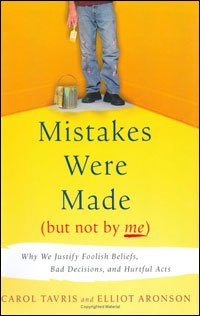You are only seeing posts authors requested be public.
Register and Login to participate in discussions with colleagues.
Mistakes were made (but not by me): Cognitive dissonance
Public
 Mistakes were made (but not by me): Why we justify foolish beliefs, bad decisions, and hurtful acts... a book co-authored by Elliot Aronson.
Mistakes were made (but not by me): Why we justify foolish beliefs, bad decisions, and hurtful acts... a book co-authored by Elliot Aronson.
Psychiatrists specialize in the ails of individuals. Social psychologists specialize in the ails of groups. The eminent social psychologist Elliot Aronson was interviewed in a CBC audio "podcast" available from the following site:
http://podcast.cbc.ca/mp3/ideas_20080428_5430.mp3
It is an interesting program from the CBC radio “Ideas” on the subject of cognitive dissonance. It offers some insight into how people can so badly misinterpret things to fit their preconceived notions and prejudices and become incapable of accepting any other view.
The program runs about 50 minutes and I suspect if people even listen to just the first 12 minutes they might find it sufficiently compelling to listen to the rest. (The MP3 file can be imported into iTunes or other music manager or burned to CD.)
The theory of cognitive dissonance has been borne out by empiric research.
Minutes twelve to eighteen describe Aronson’s own experience, illustratating how it does not occur to an author to criticize their own work. Only after his mentor berated him, for having so little respect for his own intelligence, did it dawn on Aronson it fell to him to find the problems in his own paper.
He said of his experiences working with that mentor and pioneer in the field, Leon Festinger, "He had a reputation for being a very difficult, rather harsh person, which he deserved, and my first impulse was to keep away from him because of my own insecurity, but I ended up taking a seminar with him where he first articulated the ideas for his theory of cognitive dissonance, and [as I worked with him] I realized that although he was difficult and sometimes harsh, the rose was worth the thorns... he was terrifically smart and also a warm human being."
Aronson’s first experiment centred on the notion that if you work hard for something, you will like it better than if you had gotten it without having had to work hard for it. He invited people to join what was supposed to be a "high-level" discussion group. The participants were made to first undergo a harsh initiation, a very mild one, or none at all and were then each duped to believe they had joined "their group, in process" and then had to rate what – unknown to them – had been scripted to be as banal, poorly articulated and self-contradictory as possible. Those who had undergone no or mild initiation rated the experience as painfully boring, and many wanted to resign. Those who had undergone the severe initiation rated the group members as very smart and nice, and their discussion as highly interesting – they "loved it".
Cognitive dissonance operates just beneath the level of awareness. After the above subjects were debriefed, most of the people who had undergone the severe initiation acknowledged the premise as interesting and plausible yet discounted that it had any contribution to how they themselves evaluated their own group.
The author developed a co-operative learning technique, the "jigsaw classroom", from whose application we might learn something:
http://www.jigsaw.org/about.htm





Cognitive dissonance: insight into (and out of) a "bad place"?Public
I found the podcast enlightening because it makes it possible to reconcile how good people can end up down a path from which they can have an awfully hard time returning.
Brilliant interview with clinical and personal growth tidbitsPublic
This radio interview with Elliot Aronson is brilliant with wonderful tidbits to help us in our understanding when we are helping others in clinical settings and in our own personal growth. It also contains a great personal story with some history of the development of the ideas of Abraham Maslow and Leon Festinger. I have recommended this radio interview to my spouse, children and friends. It is definitely, worth a listen.
Thanks for bringing it to our attention.
Here is another interview with AronsonPublic
Here is another good podcast, the NPR interview with Elliot Aronson,
Why It's Hard to Admit to Being Wrong : NPR